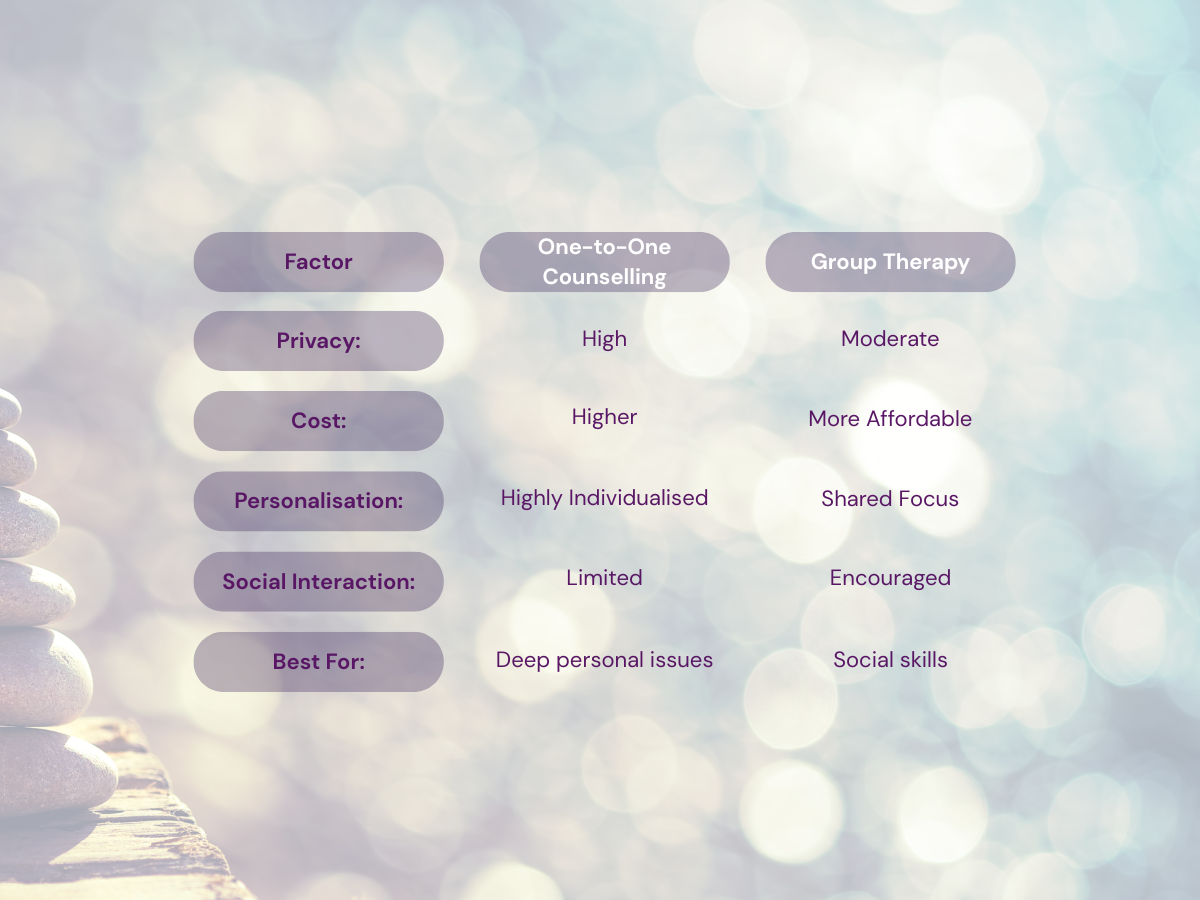Mental health treatment is a deeply personal journey, and finding the right type of therapy can make a significant difference in recovery and well-being. One-to-one counselling and group therapy are two widely used approaches, each offering unique benefits and addressing different needs.
Understanding their differences, pros and cons, and overall effectiveness can help you determine which option suits your personal situation best.
One-to-one counselling involves individual sessions with a trained therapist, offering a private and tailored approach to mental health support. This type of psychotherapy is highly effective for individuals dealing with anxiety, depression, and other mental health conditions that require personalised attention.

Group therapy involves structured group therapy sessions led by a trained facilitator, bringing together individuals with similar mental health concerns. Support groups provide a communal setting where participants can share their experiences, learn from one another, and practice essential social skills.

One-to-One Counselling: Pros
One-to-One Counselling: Cons
Group Therapy: Pros
Group Therapy: Cons

Determining whether one-to-one counselling or group therapy is the right fit depends on several factors:
For some individuals, a combination of both therapy types can be beneficial. Participating in one-to-one counselling while also attending group therapy sessions allows for private exploration of deep-seated emotions while benefiting from the social reinforcement provided by a support group.
Regardless of the path you choose, seeking professional help is a crucial step toward better mental health. Whether through individual counselling or group therapy, finding a trained therapist who aligns with your needs will enhance your chances of recovery and long-term well-being.
The Eaves Counselling and Psychology Ltd is a select professional body of Counsellors, Psychotherapists and Psychologists, providing high quality psychological care Monday to Saturday between 9am and 9pm from our practices in Guildford, Godalming, Farnham, Haslemere and online.
Are you a business owner or would like more support from your job? The Eaves’ own Employee Assistance Programme (EAP) service for small to medium businesses is easy, affordable and gives staff instant access to our large team of in-house Counsellors and Psychologists at a time and date to suit them.
If you need immediate support please find our list of useful contacts
No, participation in group therapy is voluntary. While sharing is encouraged, you can listen and engage at your own pace. As trust develops within the group, many people feel more comfortable opening up over time.
Yes, many individuals benefit from combining both approaches. One-to-one counselling allows for deep personal exploration, while group therapy provides social support and diverse perspectives. Your therapist can help determine the best combination for your needs.
The time frame for progress varies based on individual needs, the nature of the issues being addressed, and the therapy approach used. Some people notice improvements within a few sessions, while others require long-term support. Consistency and engagement play key roles in achieving meaningful results.
Yes, therapy is flexible. If you start with one-to-one counselling and feel you would benefit from peer support, you can transition to group therapy. Likewise, if you begin with group therapy but need more personalised attention, you can move to individual counselling. Many people integrate both for a balanced approach.
Yes, group therapy can be just as effective as one-to-one counselling, depending on the issue being addressed. It provides peer support, multiple perspectives, and social reinforcement, which are beneficial for many mental health concerns. However, for deep-seated trauma or severe mental health conditions, individual counselling may be more appropriate.